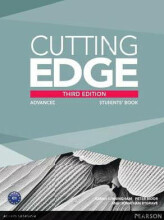Summary: Cutting Edge | 9781447936800 | Sarah Cunningham
- This + 400k other summaries
- A unique study and practice tool
- Never study anything twice again
- Get the grades you hope for
- 100% sure, 100% understanding
Read the summary and the most important questions on Cutting Edge | 9781447936800 | Sarah Cunningham
-
3.1 grammatica
This is a preview. There are 2 more flashcards available for chapter 3.1
Show more cards here -
When do we use Present Simple for Past time (v.t.) (2)
1) Innewspaper headlines ("Minister quits")
2) telling ajoke or when werelate to a story -
When do we use Present Simple for present time (t.t.) (2)
1) when werefer to an action which happens at the moment of speaking ("I name this shipLexa . Ipronounce you man and wife")
2) whencommentating on a present action ("He shoots.. Andscores ") -
When do we use Present Continuous for present time (t.t) (1)
1) when it is a longer event ("And now I amslicing theonions ") -
When do we use Present Simple for future time (4)
1) when we talk about future events which aretimetabled ("The newcinema opens next week")
2) When werefer to the future after timeconjunctions such as:
* If, When, before, as soon as, until, once, while, by the time etc. ("I will phone as soon as we have checked in")
3)After relative pronouns such as WHO and WHERE, AS, THAN and WHETHER
4) To describe future events which are officially organised / timetabled
* Often we use the present form of BE + INFINITIVE with TO -
Which tense do we use to talk about unreal situations in the past?
Past Perfect
("If it had been up to me") -
When do we use the past form (unreal situations) (3.5)
1) Imaginary situations with IF ("If men had to undergo pregnancy")
- variation on this form is IF + WERE + TO + INFINITIVE
("If I were to tell you that")
2) After I WISH, I'D RATHER/SOONER, I SUPPOSE/IMAGINE & IT'S TIME
-these ideas are imaginable/desirable but contrary to actual facts
("I wish I had enough money to buy ....")
3) When making request more tentative and distant
("Was there anything else, sir?") -
What are the General rules for Tense Sequence (2)
1) The verb in asub-clause is usually in thesame tense as the verb in themain clause
("As soon as I heard my mother's voice (sub-clause) I knew something was wrong (main clause))
2) If themain clause is in thepast , so are the verbs whichfollow it even if they are still true now
("From our very first meeting, I knew you were the right person") -
What are the tense rules for Reported Speech (4)
1) If the main clause is in the past, so are the verbs which follow it
2)After a past tense reporting verb (said, told) the reported words are not in the same tense as the original
3) If the fact is still important now, we can use a present tense
4) With verbs like SAY and TELL we tend to use the Past simple to report the exact words & the Past Continuous to report the gist of what was said -
4.1 grammatica
This is a preview. There are 32 more flashcards available for chapter 4.1
Show more cards here -
What kind of adjectives are ungradable adjectives
Adjectives with a very strong meaning or an absolute meaning (normally do not have a comparative form) -
What kind of adjectives are gradable adjectives
Adjectives which can follow words lijk very and quite (these have comparative and superlative forms)
- Higher grades + faster learning
- Never study anything twice
- 100% sure, 100% understanding
































